
-
 US stocks slide as inflation expectations jump
US stocks slide as inflation expectations jump
-
Trump demands US aid agency closure despite tumult

-
 Dupont glad England have barred Toulouse team-mate Willis from 'Le Crunch'
Dupont glad England have barred Toulouse team-mate Willis from 'Le Crunch'
-
DR Congo conflict advances as UN warns of regional escalation

-
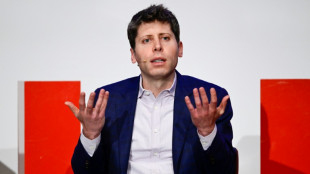 OpenAI's Altman warns EU regulation may hold Europe back
OpenAI's Altman warns EU regulation may hold Europe back
-
Flowers in the sand: families mourn Senegal migrants lost at sea
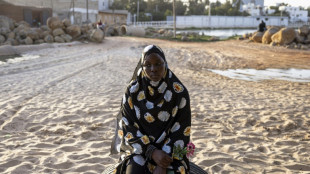
-
 India PM Modi to meet Trump in US visit next week: foreign ministry
India PM Modi to meet Trump in US visit next week: foreign ministry
-
2 dead after small plane crashes on busy Sao Paulo street, hits bus

-
 Venezuela brands Rubio a 'thief' over US jet seizure
Venezuela brands Rubio a 'thief' over US jet seizure
-
Trump slams paper straws, vows 'back to plastic'
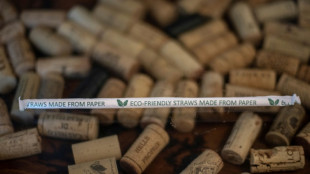
-
 Tsitsipas falls to giant-killer Bellucci in Rotterdam
Tsitsipas falls to giant-killer Bellucci in Rotterdam
-
Pakistan opens renovated Champions Trophy stadium

-
 Italy Church abuse group highlights toll on families
Italy Church abuse group highlights toll on families
-
US sees slower January job growth, below expectations

-
 Krueger downs Noskova to reach Abu Dhabi final
Krueger downs Noskova to reach Abu Dhabi final
-
US stocks rise as investors digest US jobs report

-
 NBA in touch with Decathlon over China forced labour accusations
NBA in touch with Decathlon over China forced labour accusations
-
Reid, the father figure behind the Chiefs dynasty

-
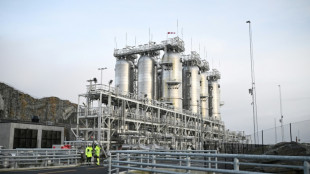 UK MPs warn billions spent on carbon capture may hit bills
UK MPs warn billions spent on carbon capture may hit bills
-
Trump's trade tempest: Week one

-
 Top cycling teams pull out of French race over safety issues
Top cycling teams pull out of French race over safety issues
-
Man City women's star Shaw misses game due to online abuse

-
 Russia says captured key mining town of Toretsk in east Ukraine
Russia says captured key mining town of Toretsk in east Ukraine
-
US envoy says Hezbollah 'defeated', must not be in Lebanon government

-
 US job growth misses expectations in January
US job growth misses expectations in January
-
Hamas and Israel set for next Gaza truce exchange

-
 Xi attends opening of Asian Winter Games in China's icy Harbin
Xi attends opening of Asian Winter Games in China's icy Harbin
-
Greek PM insists no danger from Santorini quake swarm

-
 2 dead after small plane crashes in Sao Paulo street, hits bus
2 dead after small plane crashes in Sao Paulo street, hits bus
-
Campaigning ends as violence-weary Ecuadorans eye Sunday vote

-
 London's Grenfell Tower to be taken down after deadly 2017 fire
London's Grenfell Tower to be taken down after deadly 2017 fire
-
England captain Itoje turned down French club move to fulfil Test dreams

-
 'Perfect' Odermatt delivers super-G masterclass for third world gold
'Perfect' Odermatt delivers super-G masterclass for third world gold
-
Slot keen to make Liverpool's 'good' season a 'great' one

-
 Postecoglou braced for Spurs 'pile-on' after League Cup collapse
Postecoglou braced for Spurs 'pile-on' after League Cup collapse
-
Putin hails Russia's strong 2024 economic growth

-
 England's El-Abd always knew France star Dupont would go far
England's El-Abd always knew France star Dupont would go far
-
Smith and Carey tons put Australia into lead in second Sri Lanka Test

-
 Odermatt delivers super-G masterclass for third world gold
Odermatt delivers super-G masterclass for third world gold
-
Disgraced 'Emilia Perez' star vows to remain 'silent'
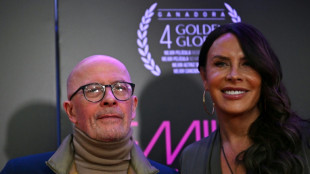
-
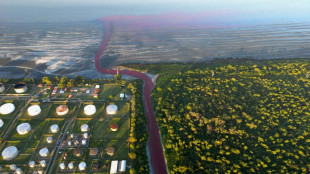 A stream turns blood red in Argentina, residents blame pollution
A stream turns blood red in Argentina, residents blame pollution
-
Stock markets, dollar mixed before key US jobs data

-
 'Existential threat': What next for the ICC after US sanctions?
'Existential threat': What next for the ICC after US sanctions?
-
Papadakis and Hubbell take same-sex ice dancing to new level

-
 Hostage families urge Israel to complete Gaza truce deal ahead of swap
Hostage families urge Israel to complete Gaza truce deal ahead of swap
-
UN warns worst may be yet to come if east DRC violence spreads

-
 Germany logs record US surplus amid Trump tariff fears
Germany logs record US surplus amid Trump tariff fears
-
'Irresponsible' or 'antiwar': US fighters in Ukraine grapple with Trump

-
 Rivals lurk as Vonn headlines world downhill
Rivals lurk as Vonn headlines world downhill
-
Smith digs Australia out of trouble in second Sri Lanka Test

| JRI | -0.63% | 12.75 | $ | |
| BCC | -2.64% | 121.89 | $ | |
| SCS | -2.8% | 11.265 | $ | |
| CMSD | -0.13% | 23.8 | $ | |
| RBGPF | 0.77% | 66.51 | $ | |
| RYCEF | -1.07% | 7.45 | $ | |
| CMSC | -0.34% | 23.36 | $ | |
| VOD | 1% | 8.525 | $ | |
| RELX | -0.68% | 50.06 | $ | |
| BCE | -4.27% | 22.557 | $ | |
| NGG | -0.15% | 61.58 | $ | |
| RIO | -0.32% | 61.99 | $ | |
| AZN | -0.12% | 72.27 | $ | |
| BP | 0.47% | 32.11 | $ | |
| BTI | -0.04% | 41.605 | $ | |
| GSK | -0.97% | 36.03 | $ |

US envoy says Hezbollah 'defeated', must not be in Lebanon government
A senior US official visiting Beirut warned Friday against any Hezbollah presence in Lebanon's new government, saying the Iran-backed group was "defeated" in its war with Israel.
More than a year of hostilities severely weakened Hezbollah, allowing Lebanon's divided parliament to elect Joseph Aoun president and approve Nawaf Salam as premier after more than two years of political deadlock.
The visit by US Deputy Special Envoy for the Middle East Morgan Ortagus comes with Salam struggling to form a government as he faces political pressure from Hezbollah and its allies.
"We have set clear red lines in the United States that they (Hezbollah) won't be able to terrorise the Lebanese people, and that includes by being a part of the government," Ortagus said after meeting President Joseph Aoun, long seen as Washington's preferred candidate.
She went on to declare "the end of Hezbollah's reign of terror in Lebanon and around the world".
"Hezbollah was defeated by Israel and we are grateful to our ally Israel for defeating Hezbollah," Ortagus said.
Aoun later distanced himself from her comments, with his office saying some of what she said after the meeting "represents her own point of view and is not the concern of the presidency".
Israel decimated much of Hezbollah's leadership and capabilities, and killed its chief of more than three decades, Hassan Nasrallah.
The ousting of Syrian ally Bashar al-Assad further disrupted the group's arms supply lines.
- 'Reign of terror' -
Ortagus was in Lebanon for her first official visit abroad after being appointed by US President Donald Trump.
Hezbollah has played a major role in the country's politics for decades, flexing its power in government institutions while its fighters tangle with Israel.
Ortagus voiced hope the incoming government "will ensure that we start to end corruption, that we end influence from Hezbollah, and that we embark on the reforms for a greater country".
The international community has long demanded reforms to unlock billions of dollars in aid after a financial crisis took hold in 2019, widely blamed on corruption and mismanagement.
Salam said Wednesday that his government would exclude all members of political parties and anyone who planned to run in parliamentary elections. In Lebanon, traditional political parties are widely accused of corruption.
The prime minister said he did not want to allow "anyone inside (the government) to obstruct its work in any way whatsoever".
Political power has long been shared according to sectarian quotas in Lebanon, and Hezbollah and its ally Amal, whose leader Nabih Berri is also parliament speaker, have insisted they approve any Shiite ministers Salam wants to name.
Salam has refused to do so.
Sectarian power-sharing has often been used to obstruct political life when parties refuse to compromise -- a strategy that had left Lebanon without a president for two years until Aoun's election.
- Ceasefire deadline -
Salam has vowed to enact reforms and "rebuild a state", as well as implement a UN resolution that calls for Israel to withdraw from Lebanon and for Lebanon's army and UN peacekeepers to be the only forces deployed in the south.
After meeting Ortagus, Aoun said that "consultations to form a new government are nearly completed", while also calling on Israel to withdraw from Lebanon's south.
"The Lebanese army is ready to deploy in villages and towns from which Israeli forces withdraw," he said, insisting they pull out within the agreed timeline.
Washington played a key role in brokering the November 27 ceasefire agreement between Israel and Lebanon, which ended more than a year of hostilities, including two months of all-out war.
Under the deal, Lebanon's military was to deploy in the south alongside UN peacekeepers as Israel withdrew over 60 days.
Hezbollah was also to pull back north of the Litani River -- about 30 kilometres (20 miles) from the border -- and dismantle any remaining military infrastructure in the south.
The withdrawal period was extended to February 18, after both sides accused each other of violations, and Israeli troops still remain in some areas.
Ortagus said Washington was "very committed" to the new withdrawal date.
E.Rodriguez--AT
